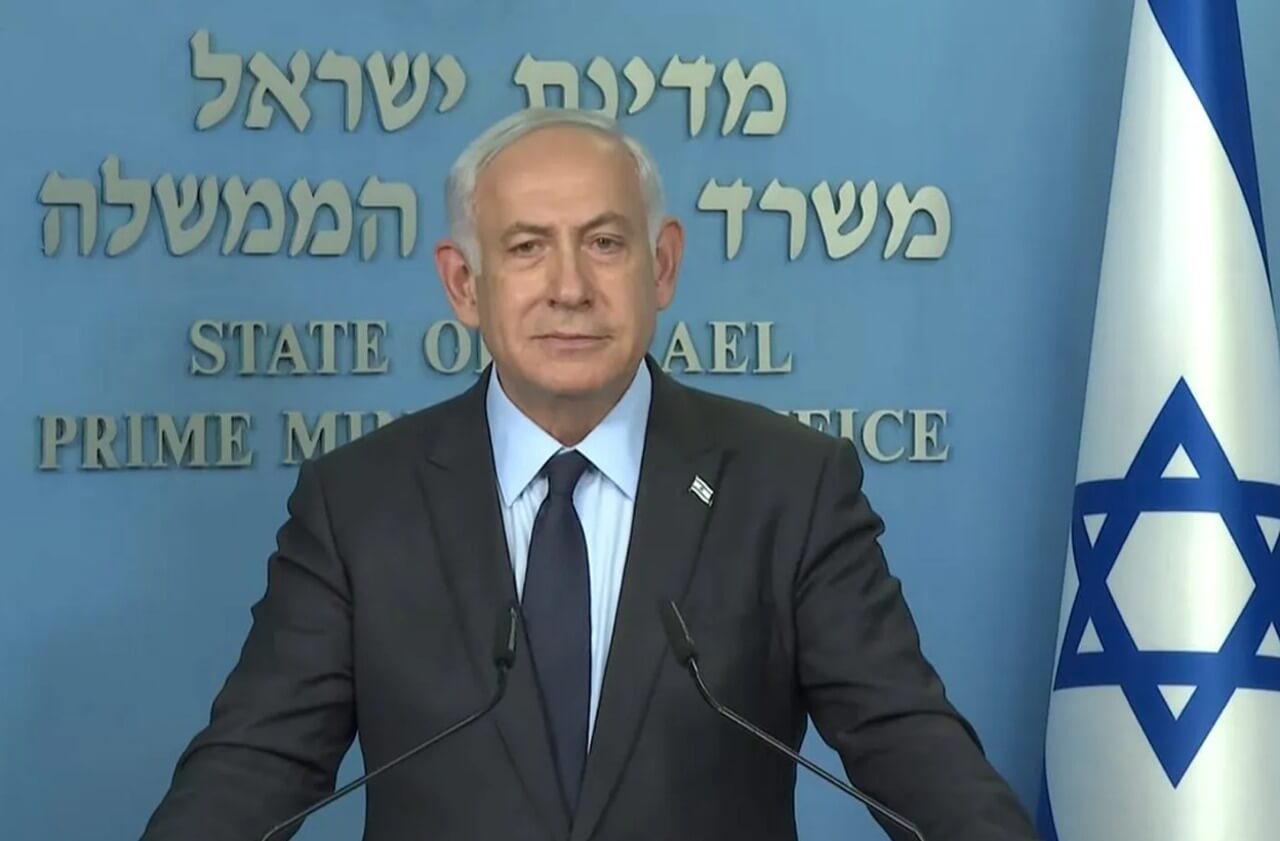Netanyahu pauses judicial overhaul after unprecedented strikes, protests rock Israel
Netanyahu’s speech comes after a night of historic protests against the judicial coup, followed by a general strike on Monday

Graphic by Angelie Zaslavsky
This article originally appeared on Haaretz, and was reprinted here with permission. Sign up here to get Haaretz’s free Daily Brief newsletter delivered to your inbox.
Israeli Prime Minister Benjamin Netanyahu said on Monday he would temporarily freeze his government’s controversial plans to enfeeble the judicial system, following a night of mass demonstrations across the country and an unprecedented general strike.
Netanyahu said that he ordered “the pause” on the controversial legislation until after the Knesset recess in order “to give a real opportunity for real dialogue.”
“One thing I am not willing to accept – there are a minority of extremists that are willing to tear our country to shreds…escorting us to civil war and calling for refusal of army service, which is a terrible crime,” Netanyahu said.
Months of pro-democracy protests came to a head on Sunday night when tens of thousands of Israelis took to the streets in spontaneous rallies after Netanyahu’s shock firing of Defense Minister Yoav Gallant, who had called on the government to halt the legislative blitz that has divided the country.
While several members of Netanyahu’s own Likud party and his ultra-Orthodox allies expressed support for temporarily shelving the legislation until after Passover, the far-right parties in the coalition have doubled down, calling for right-wingers to take to the street across the country.
Besides calls by Finance Minister Bezalel Smotrich and Simcha Rothman – chair of the Constitution, Law and Justice Committee and one of the major figures behind the controversial overhaul – various far-right grassroots groups have gone further and explicitly encouraged violence in counter-demonstrations on Monday evening.
The police announced they would send reinforcements to protect the protesters in light of the threats.
The Religious Zionism faction had earlier called on Netanyahu not to bow to the pressure of “anarchists” and continue the legislative process. Justice Minister and overhaul architect Yariv Levin had also previously threatened to resign if the legislation was halted, but informed Netanyahu on Monday that he will “respect any decision” by the prime minister.
Amid calls by senior Likud members for him to resign and take responsibility “for the great damage he brought upon the country,” Levin warned that current chaos might lead to the government’s immediate fall, urging MKs and coalition partners to “make an effort to stabilize the government and the coalition.”
National Security Minister Itamar Ben-Gvir, for his part, threatened to resign if the legislation was stopped on Monday.
Thousands of protesters have gathered in front of the Knesset in Jerusalem, with thousands more on their way. A large police force has been deployed in the area, and the nearby streets are blocked to traffic.
Thousands of protesters have also gathered in front of Ben-Gurion University in Be’er Sheva, while hundreds are protesting in the central Israeli city of Ra’anana and in Haifa.
On Monday, the chair of Israel’s General Federation of Labor, the country’s largest association representing the majority of its trade unionists, warned that it was preparing for a labor strike of historic proportions unless the judicial overhaul plan is suspended immediately.
“This is a country of its citizens, all its citizens. Not of the Kohelet [Policy] Forum!” chairman Arnon Bar-David declared in a feisty speech. “We will not permit the country’s descent into the abyss… If the legislation isn’t stopped, we are going from here to a general strike in Israel.”
Following his speech, Israel’s national labor union shut down Israel’s only international Ben-Gurion Airport to incoming and outgoing flights, while Israel’s doctors union announced an immediate freeze of the health care system until a halt of judicial overhaul is announced.
Local municipalities and lawyers in the civil service joined the general strike along with the Israeli nurses union, the Israeli Attorneys’ Organization, Israel’s largest shopping center, and an indefinite suspension of studies was announced by all research universities in Israel and some colleges.
Israelis have been protesting for 12 consecutive weeks against the Netanyahu government’s proposed judicial overhaul, which would significantly strengthen the executive branch of government at the expense of the judiciary. The plan includes laws guaranteeing the government a majority in the panel selecting judges and allowing the Knesset to overrule Supreme Court rulings with a simple majority.
Liza Rozovsky, Anshel Pfeffer, Chen Maanit and Ido Efrati contributed to this report.












